TODAY’S READING FROM THE OLD TESTAMENT- 1 Kings 5-6:38
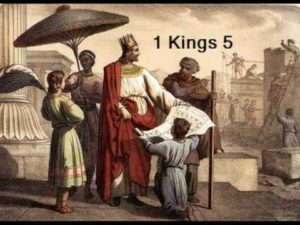 In Chapters 3 and 4, we learned of events that took place in the first three years of Solomon’s reign, before he began to build the temple.
In Chapters 3 and 4, we learned of events that took place in the first three years of Solomon’s reign, before he began to build the temple.
Solomon is mentioned nearly 300 times in the Old Testament and 12 times in the New Testament. He is both wise and foolish.
He was gifted by God with wisdom for getting things done and resolving disputes with keen insight. Yet, he used people to support his extravagant lifestyle. When he died, people begged his successor, Rehobaom, to lighten the heavy yoke Solomon had put upon their necks.
He is wise in areas of politics and commerce, but he is foolish in his disregard of God’s laws that clearly forbade a king from multiplying wives. The law also forbade multiplying horses. Solomon was an accomplished horse trader (Deuteronomy 17:14-17; 1 Kings 4:26; 2 Chronicles 1:14-17; see Psalm 20:7). He is known to have relied too heavily on his own authority, possessions, and accomplishments rather than God’s.
As we learned yesterday, Solomon was a prolific author of songs (psalms), but we have only three of the three thousand he reportedly wrote in Holy Scripture (Psalm 72, 127, and Song of Solomon). Solomon is better known for his proverbs and his assessment of the natural man’s life (The Book of Ecclesiastes).
David had moved the Ark of the Covenant to Jerusalem, but the altar of sacrifices was still at Gibeon, one of the Canaanite high places that the Israelites were told to destroy. The tabernacle was temporarily located at Gibeon, and Solomon dedicates himself to YAHWEH there with 1000 burnt offerings as a sign of total consecration.
It is recorded in Scripture that God spoke to Solomon on four occasions. 1) In the dream at Gibeon (3:10-15). 2) During the building of the temple (6:11-13) 3) After the completion of the building projects (9:3-9) and 4) When Solomon disobeyed God’s Word and turned to idolatry (11:9-13). Notice that the LORD stressed in His first three messages to Solomon the importance of obedience. In the 4th message, Solomon is rebuked and chastised for his disobedience.
1 Kings 11:9-13 9 Now the LORD was angry with Solomon because his heart was turned away from the LORD, the God of Israel, who had appeared to him twice, 10 and had commanded him concerning this thing, that he should not go after other gods; but he did not observe what the LORD had commanded. 11 So the LORD said to Solomon, “Because you have done this, and you have not kept My covenant and My statutes, which I have commanded you, I will surely tear the kingdom from you, and will give it to your servant. 12 “Nevertheless I will not do it in your days for the sake of your father David, but I will tear it out of the hand of your son. 13 “However, I will not tear away all the kingdom, but I will give one tribe to your son for the sake of My servant David and for the sake of Jerusalem which I have chosen.”
It was King David’s desire to build a dwelling place for God in Jerusalem (Psalm 132:3-5; 27:4). But God knew that David was so busy fighting wars and defending Israel that he did not have time to devote himself to that project.
In the Davidic Covenant, God promises that a descendant will build what David is desiring in his heart.
2 Samuel 7:12-13 12 “When your days are complete and you lie down with your fathers, I will raise up your descendant after you, who will come forth from you, and I will establish his kingdom. 13 “He shall build a house for My name, and I will establish the throne of his kingdom forever.
The temple that Solomon will build is a ‘placeholder’ for that which will be established through the Son of David, the Messiah.
 Solomon is now ready to build. He wants worthy materials, such as the cedars and cypress of Lebanon, known to be the best, most sturdy, tight-grained, rot-resistant hardwood for building.
Solomon is now ready to build. He wants worthy materials, such as the cedars and cypress of Lebanon, known to be the best, most sturdy, tight-grained, rot-resistant hardwood for building.
King Hiram of Tyre rejoices when he learns of Solomon’s request for building material. He gladly ships logs, timbered by the Sidonians, tying them into rafts to be floated from the Mediterranean seacoast to a port in Israel, where it will be transported over land to Jerusalem.
Solomon, in turn, rewards Hiram with an annual provision of food for his household and one large payment to the workers for their labor
2 Chronicles 2:10 10 “Now behold, I will give to your servants, the woodsmen who cut the timber, 20,000 kors of crushed wheat and 20,000 kors of barley, and 20,000 baths of wine and 20,000 baths of oil.”
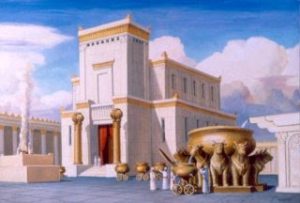 The two kings make a peace treaty. Solomon then organizes his workforce (1 Kings 5:13-18) and appoints Adoniram as their supervisor.
The two kings make a peace treaty. Solomon then organizes his workforce (1 Kings 5:13-18) and appoints Adoniram as their supervisor.
The structure is approximately 90 feet long and 30 feet wide, and 45 feet tall. A 35-foot-wide porch 15 feet deep stood at the front of the temple.
It is interesting to note that the stones were quarried and chiseled miles away from the temple site.
1 Kings 6:7 7 The house, while it was being built, was built of stone prepared at the quarry, and there was neither hammer nor axe nor any iron tool heard in the house while it was being built.
This reminds us that as Jesus is building His church, preparing living stones, much of what He is doing is internal, hidden, and unsounded! But what a magnificent temple He is building for His presence and kingdom reign to be displayed!
God took two of David’s most notorious sins, his adultery with Bathsheba (2 Samuel 11) and his prideful census-taking (2 Samuel 24), and by means of these events brought about the birth of Solomon and the purchasing of the temple mount (the threshing floor of Araunah). Now Solomon is building the land purchased by the repentant sinner. What a picture of God’s grace!
TODAY’S READING FROM THE NEW TESTAMENT – Acts 7:1-29
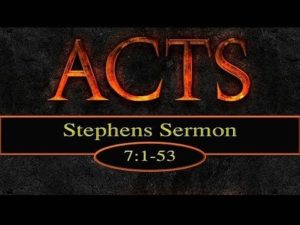 Stephen is being tried before the Sanhedrin, falsely accused of speaking blasphemously against Moses and God (Acts 6:11) and against the temple and the Law (6:13).
Stephen is being tried before the Sanhedrin, falsely accused of speaking blasphemously against Moses and God (Acts 6:11) and against the temple and the Law (6:13).
Stephen reminds them of their true story. He reminds them that their heritage begins not with Moses, the Law, and the temple but with “the God of Glory” (7:2). It is He who made a promise to Abraham to birth a nation, to give a land, and provide salvation (7:3-7).
The Abrahamic covenant of circumcision preceded the Mosaic covenant of the Law and pointed to the fact that God would provide the means for dealing with sin and making them a people belonging to Himself through Abraham’s promised seed.
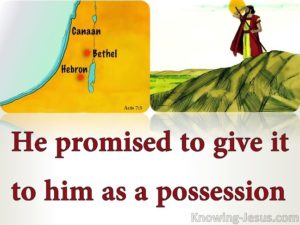 Stephen reminds the Sanhedrin that throughout their history, they have been anticipating the fulfillment of God’s promise. Abraham was promised a land, and yet, God “gave him no inheritance in it, not even a foot of ground, and even when he had no child” (7:5). God fulfills His promises His way and in His time.
Stephen reminds the Sanhedrin that throughout their history, they have been anticipating the fulfillment of God’s promise. Abraham was promised a land, and yet, God “gave him no inheritance in it, not even a foot of ground, and even when he had no child” (7:5). God fulfills His promises His way and in His time.
Yet He promised that HE WOULD GIVE IT TO HIM AS A POSSESSION, AND TO HIS DESCENDANTS AFTER HIM. God may not fulfill His promises the way we would like or according to our timetable. But He does fulfill His promise.
The God of glory who spoke to Abraham also spoke to Moses at the burning bush. In each case, God was speaking about a future promise- “the coming of the Righteous One” (Acts 7:52).
Far from blaspheming God, Stephen is rightfully glorifying God in his speech. He is extolling Him as the God of glory, the keeper of His promises, the deliverer of His people, and the God who cannot live in buildings made by human hands. Far from blaspheming Moses, Stephen honors the law of Moses and the God of Moses. He reminds them that their ancestors at times disowned and dishonored Moses.
Through jealousy in the heart of their ancestors, Joseph was rejected. Through pride and rebellion, Moses was rejected. And now they are rejecting the One Abraham and Moses anticipated.
TODAY’S READING FROM THE BOOK OF PSALMS- Psalm 127:1-5
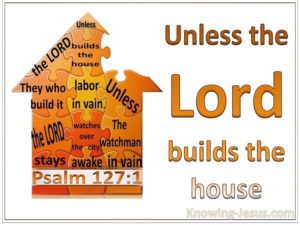 “Unless the Lord builds the house, they labor in vain who build it.”
“Unless the Lord builds the house, they labor in vain who build it.”
This Psalm speaks of efforts that can be in vain. Even noble efforts such as building a house, providing shelter for others, protecting, guarding, rising early, and working hard for our food.
God must be the recognized source of the strength for our labor, and our motive must be to give Him glory. We must recognize His grace.
“For He gives to His beloved even in his sleep” (Psalm 127:2).
No amount of human sacrifice or toil will amount to anything of eternal significance unless God is in it.
And so, God is also to be recognized as the Father of the family. Children are His gift to us. Our offspring are God’s instruments in resisting and rebuking the enemy. They are strategic in fighting the battles in the years to come.
Psalm 127:5 5 How blessed is the man whose quiver is full of them; They will not be ashamed When they speak with their enemies in the gate.
TODAY’S READING FROM THE BOOK OF PROVERBS- Proverbs 16:28-30
Proverbs 16:28-30 28 A perverse man spreads strife, and a slanderer separates intimate friends. 29 A man of violence entices his neighbor and leads him in a way that is not good. 30 He who winks his eyes does so to devise perverse things; He who compresses his lips brings evil to pass.
These proverbs remind us of destructive character traits. They are characteristics of the old man ‘in Adam’ and not the new man ‘in Christ’. Avoid trouble-makers and don’t be one. Gossip and slander can sabotage even the best of friendships. Those whose hearts are intent on doing harm often recruit unsuspecting accomplices through enticement. Be attentive not only to the people’s words but their body language and facial expressions, so you are not easily duped. Be discerning.
PRAY FOR THE NATIONS (from “Operation World Prayer Guide”)
Most southerly and largest island of the Marianas Archipelago; 6,000 km west of Hawaii. Also included here (but not as part of Guam itself) are the three tiny US Territories of Johnston Island (2.8 sq. km; 1,300 km from Hawaii), Midway Island (5.2 sq. km; 2,350 km) and Wake Island (6.5 sq. km; 3,700 km).
Guam is the hub of Micronesia, and as such the population is multicultural and diverse. There is a spiritual and church growth among many of the immigrant communities, including Chinese, Koreans, and Filipinos.
Population: 179,893 Annual Growth: 1.31%
Capital: Agana
Urbanites: 93.2%
Peoples
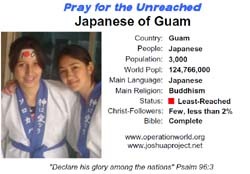 Peoples: 13 (8% unreached) All peoples
Peoples: 13 (8% unreached) All peoples
Unreached Peoples Prayer Card
Official language: Chamorro; English Languages: 8 All languages
Religion
Largest Religion: Christian
|
Religion |
|
Pop % |
Ann Gr |
|
173,939 |
96.69 |
1.3 |
|
|
25,621 |
14.2 |
0.6 |
Challenges for Prayer
The Prison Fellowship of Guam has a ministry to prisoners that is also penetrating the indigenous population in a small but significant way. It has fostered a cooperative unity among evangelical churches (with 85 volunteers), which is sadly lacking elsewhere. Pray for resources to teach and train converts who remain in prison.
The influx of US culture with all its pros and cons has irrevocably shaped Guam. There is an increasing wealth and tourism, but also gambling, substance abuse and prostitution/ sex trafficking. With the American military presence increasing on the island, these issues will only intensify in the future. Pray for Biblical righteousness to shape Guam’s society and public life.
PRAYER: God of glory, God of all grace, thank You for enlightening our understanding by giving us ears to hear Your Word and hearts to obey it. A greater than Solomon lives in us by the Holy Spirit. Teach us to rely on You more, for unless You do the work, we labor in vain. You are building a house for Your glory of the incorruptible material. You are doing a hidden and quiet work in us, fashioning us to fit perfectly together as a habitation for Your Holy Spirit. Thank You for the younger generation and make them useful in planting the seed of Your Word and fighting the battle for truth in the days ahead. In Jesus’ Name, we ask it. Amen.
Pastor David

